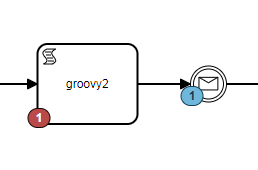Hello guys,
had a chance again to work a little bit on this.
So I tried to implement the jsch solution in groovy
so far I came to the following with help of internet :
import com.jcraft.jsch.JSch
import com.jcraft.jsch.Session
import com.jcraft.jsch.UserInfo
import com.jcraft.jsch.Channel
import com.jcraft.jsch.ChannelExec
import java.util.Properties
import org.camunda.bpm.engine.delegate.DelegateExecution;
import org.camunda.bpm.engine.delegate.JavaDelegate;
def sshHost = '1111.12.12.11'
def sshUser = 'vqweq
def sshPass = 'wfdssx'
def sshPort = 22
println "Opening connection to ${sshUser}@${sshHost}:${sshPort}"
Properties config = new Properties()
config.put("StrictHostKeyChecking", "no")
JSch jsch = new JSch()
Session sshSession = jsch.getSession(sshUser, sshHost, sshPort)
sshSession.setPassword(sshPass)
sshSession.setConfig(config)
sshSession.connect()
println "Connected"
// Could use "shell"
Channel channel = sshSession.openChannel("exec")
// Let's just get the hostname
((ChannelExec)channel).setCommand("cd /home/.... && ./CMND_test.sh")
// Spew errors to console
((ChannelExec)channel).setErrStream(System.err)
// We're not sending anything
channel.setInputStream(null)
// Get the input stream
InputStream is = channel.getInputStream()
// Connect
channel.connect()
// This could be written better and groovier...
byte[] tmp = new byte[1024]
// Uh oh. We really need a better way out of the loop...
while (true) {
// But it's just an example... :-)
while (is.available() > 0) {
int i = is.read(tmp, 0, 1024)
if (i<0)
break
System.out.print(new String(tmp, 0, i))
}
if (channel.isClosed()) {
// All done.
System.out.println("exit-status: " + channel.getExitStatus())
def Validity = execution.setVariable('Valid', channel.getExitStatus());
if ( Validity == 1 ) {
execution.setVariable('Valid', true)
} else if ( Valid != 1) {
execution.createIncident("someType", "someConfiguration", "someMessage");
// throw new org.camunda.bpm.engine.delegate.BpmnError('Error')
}
break
}
// Ugly: You might want to change this
try{Thread.sleep(1000);}catch(Exception ee){}
}
// Close channel and session
channel.disconnect()
sshSession.disconnect()
which gives 
which is similar to Error creating incident via javascript - #7 by StephenOTT
which I don’t like as it creates incident and token continues in my process flow
I have tried to use @StephenOTT context but with no luck
If u have an idea how to keep incident “token” on an error task then thank you for advice.